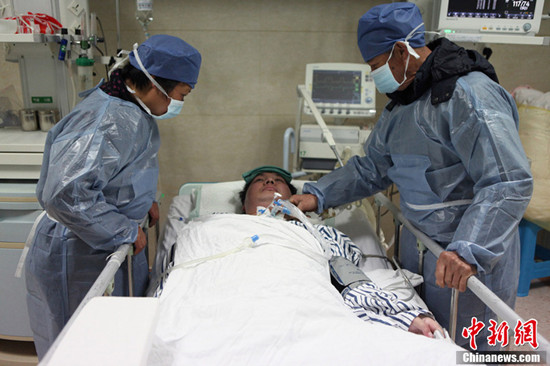
Fu Minzu and Wang Lanqin visit their son Fu Xuepeng in Taizhou No.1 People's Hospital in Zhejiang province on January 30, 2013. As the family's story recently became public knowledge, concerned people from all over the country began donating money and materials.
(Ecns.cn) -- Since their son was left paralyzed and bedridden by a motorcycle accident seven years ago, Fu Minzu and Wang Lanqin, who live in a village in east China's Zhejiang Province, have endured a long and painful struggle.
For four months the parents kept their son, who cannot breathe on his own, in intensive care, but were forced to bring him home because the treatments were too expensive, writes China Youth Daily.
Saddled with debt, the aging couple has had no time to work their farm since the accident, and their only source of income is a subsistence allowance of little more than 100 yuan (US$16) a month, according to the newspaper.
The couple followed a local doctor's advice and bought a manual emergency ventilator for their son. They then had to take turns operating it so that air was constantly being pumped into his lungs.
Sometimes, when they were lucky, their relatives would help out. At the worst of times, the couple was left alone to squeeze the ventilator thousands of times a day during the freezing winter months.
In late 2008, the boy's uncle saw on TV that someone had crafted an electric respirator with bicycle wheels, and the family immediately set about making their own.
After gathering the necessary parts and conducting a few failed experiments, they finally made a functional electric ventilator, which provided relief during nighttime hours. However, they insisted on pumping oxygen manually during the day because of the high cost of electricity.
"If we left the machine on 24 hours a day, it would cost about 200 yuan (US$32) a month and wear out faster," said Wang.
When the family's story recently became public knowledge, concerned people from all over the country began donating money and materials, and the family's situation has improved. A Beijing-based medical equipment dealer even donated a life-support ventilator.
Because the family was well-off before the motorcycle accident but reduced to extreme poverty afterward, many have blamed the rural healthcare insurance system for the family's plight.
Fu Minzu earned about 6,000 yuan (US$964) a month, but when his son was hospitalized, three days of treatment cost more than 10,000 yuan (US$1,607), and his healthcare benefits could not be applied.
The family eventually spent 1.1 million yuan (US$176,770) on hospital fees, including 600,000 yuan (US$96,420) borrowed from friends and relatives.
The sum of money is referred to as "family catastrophic" medical expenses, which are not covered by the healthcare insurance system in most of China. In Zhejiang Province, only Huzhou and Shaoxing are among the pilot cities where such expenses are covered.
And even though some of Fu's basic medical costs were covered by the rural healthcare insurance system while he was hospitalized, less than 10 percent could be reimbursed by a system that suffers from under-investment.
Fu's story has thrown the spotlight on the yawning division between urban and rural areas: cities enjoy high-quality medical care, while much of the countryside remains woefully underserved.

Copyright ©1999-2011 Chinanews.com. All rights reserved.
Reproduction in whole or in part without permission is prohibited.